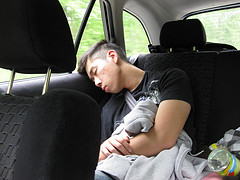
flickr.com/zmtomako
Like clockwork, you go to bed at 10:00 in the evening and wake up at 6:00 in the morning. Still, you feel tired and sluggish throughout the day. Even with your strict bedtime practice, you could be getting robbed of valuable sleep. What’s the culprit? Right, apnea.
If you usually suffer from chronic fatigue during the day, chances are good that you are experiencing sleep deprivation. The problem is that you can become so used to this type of tiredness, that it’s difficult to realize how greatly it affects your daily lifestyle. In order to improve your quality of life, you need to learn how to control your quota of sleep.
Sleep is like money; the longer you go without a sufficient supply of it, the worse your situation gets. In fact, it’s easy to run into “sleep debt” without even realizing it.
Essentially, sleep apnea is one of the worst offenders for causing sleep deprivation. OSA, or obstructive sleep apnea, is the interruption of air into the lungs while a person is sleeping. This is generally caused by some form of obstruction, and can cause severe medical consequences.
OSA is, more often than not, a nuisance rather than a potential medical emergency. If, however, the person suffering from OSA stops breathing for more than 10 seconds at a time, or if it happens more than ten times in an hour, this can be cause for alarm. If you suffer from this type of apnea, you must seek advice from your health care provider or your doctor.
Looking at how apnea and sleep deprivation affect the quota of sleep, it’s easy to see why the individual who is suffering from OSA feels lethargic or even ill during daytime hours. If your sleeping pattern is being disrupted to this degree, often many times in a single night, then you are not able to fall in to the natural, deep sleep state that is needed to rejuvenate your mind and body.
A good nights’ sleep is absolutely necessary to keep fit and stay healthy, and OSA can cause grave disruptions in a healthy sleep pattern. If OSA causes you to cease breathing while you sleep, your brain will give you a push to quickly wake you up. You’ll wake with a snort, and then fall back into normal sleep. This cycle will go on throughout the course of the night. If you display this pattern, you could be suffering from apnea and sleep deprivation.
There is a reason that OSA only happens while you sleep. In most instances, the problem is caused by a lack of muscle tone within the airway. When the body is relaxed in sleep, this weak muscle tone causes the airway to breakdown, cutting off the airway and stopping the breathing. While awake, the muscle tone of the airways is sufficient to permit regular breathing. However, in severe cases, a person may experience labored breathing during the day as well.
Sleep better! Check out the world's Best MATTRESS TOPPER.
It’s easy to poke fun at someone who snores, or become exasperated and annoyed. But if you, or your partner, display signs of chronic snoring, it may actually be a case of apnea and sleep deprivation. Keep in mind, this isn’t an annoying habit; this is a serious medical condition that can have long term consequences. Consult a doctor about treatment methods for sleep apnea and sleep deprivation.
Which one of these is this the world's best foam mattress?
Candidate "A"
Candidate "B" -- you decide 🙂
Tagged with: sleep apnea • snore
Filed under: Sleep Apnea